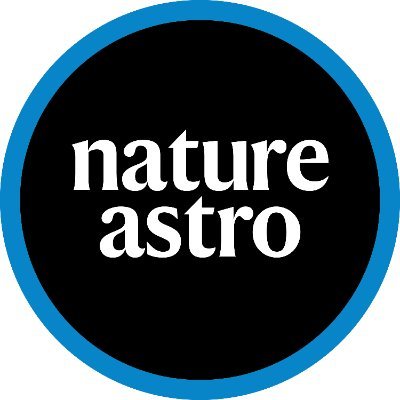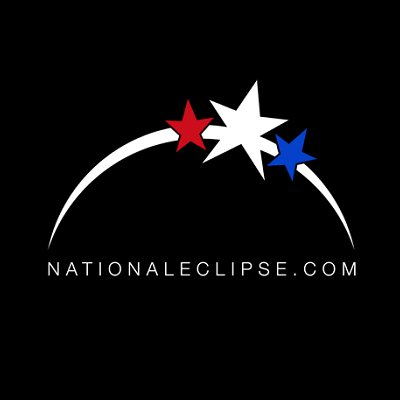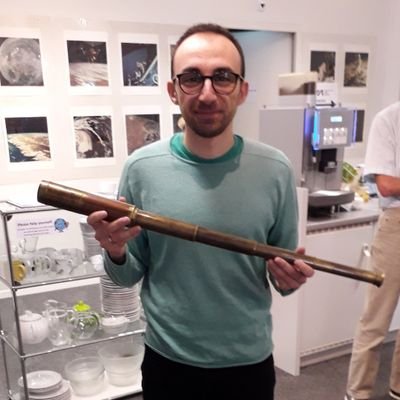
Dr. Erika Palmerio
@erikapal
Followers
14K
Following
10K
Media
2K
Statuses
5K
Research Scientist at @predsci (views mine), working on the Sun & space weather ☀️💨🛰🌍 mega space nerd also off work 🌌🔭🚀🪐
Orange County, CA
Joined September 2011
All the planets orbit the Sun roughly along the same plane, i.e. the ecliptic plane, which is also tilted with respect to the solar equator ☀️ Each planet is a bit above the Sun for half orbit and a bit below for the other half. Here are their latitudes for 30 years (2020–2050)
86
855
3K
We are nominated for "Best Use of HPC in Physical Sciences" re: our total solar eclipse 2024 continuously running prediction—Vote at this link by Friday, October 4! https://t.co/wlR2XFVqU9
1
3
13
What was launched:
#Attention #Vandenberg! Tonight (07/03) there is the possibility for a Twilight Effect #FireFly #Alpha launch, this will be carrying 8 cube sats for NASA ELaNa 43 mission. All weather conditions look supportive for a launch. T-0 is 9:04 pm PDT (0404z). → https://t.co/zF8X62sA4x
0
0
5
The very fast speeds seen atm may be due to a stream of fast solar wind rather than one of the CMEs launched in the past days, which could mean that the following eruptions will travel faster through space, albeit mostly flank encounters are expected 🙃 [movie: NOAA/SWPC]
1
9
58
Current interplanetary and storm conditions: no Radio storm, S1 Radiation storm, and G3 Geomagnetic storm. The solar wind speed is still very high (almost 900 km/s!), but the magnetic field displays rather low magnitudes and the Bz component is still oscillating around the zero.
4
19
89
What's brewin' in the solar wind—an update: Current storm conditions are: Radio R1, Radiation S1, Geomagnetic G4. Solar wind speeds are still high (~800 km/s), but the Bz field is close to zero, so G4 conditions are unlikely to hold. Will a following CME turn the lights back up?
4
13
75
Woah, G5 (extreme) geomagnetic storm conditions have been attained due to the recent CME(s) from AR 13664, with solar wind speeds at ~750 km/s and the north–south (Bz) magnetic field component almost reaching –50 nT. Enjoy the aurora show out there! 💫
11
40
176
Still craving some Sun science after the magical #SolarEclipse2024? Worry not because @AASNova has put together very nice write-ups of 3 recent solar physics research articles, including our work on exceptional observations of a CME at Mercury's orbit: https://t.co/z4hC8QFy6p ☀️
aasnova.org
Take a moment to delve into three solar physics research articles with us today to learn how researchers are studying our home star.
2
7
31
Some updates on our near-real-time prediction of the #TotalSolarEclipse of April 8, with new data products and data download—and even simulated views from existing coronagraphs in space 😉 Details in the quoted thread and at https://t.co/mJsyyjCQ9P
Only 3 days left until the #TotalSolarEclipse of April 8, 2024! Have you checked our latest prediction of the structure of the corona, updated in near-real-time at https://t.co/yaKS3Q7f8c? We have added new products over the past week, so here's a rundown thread:
4
21
72
Our live prediction of the #TotalSolarEclipse of April 8, 2024 is out! Wanna see what the majestic solar corona will look like according to our time-dependent model? ☀️ Check out how our expectations evolve with time as we assimilate real-time data at
predsci.com
Predictive Science Inc.'s latest prediction of the solar corona for the April 8, 2024 total solar eclipse.
(Im)patiently waiting for the #TotalSolarEclipse of April 8, 2024? Now you can get a sneak peek of what we expect the elusive corona to look like in the path of totality. Check out our constantly-evolving, real-time prediction at https://t.co/yaKS3Q6HiE
4
10
75
Check out this @ISSIBern Science Highlight on our project "Tomographic inversion of synthetic white-light images: Advancing our understanding of CMEs in 3D", containing a brief update on our work in progress to unveil the structure of solar eruptions! ☀️
Follow the ISSI Team around @erikapal and David Barnes on their exciting journey to decode the #sun's coronal mass ejections in 3D: ➡️ https://t.co/5ltlCQbZce
3
9
47
Final round of the #NAstroCoverComp! Give the Sun some love and vote for the February issue, featuring our MHD modeling of the elusive solar corona. From Chitta et al. (2023):
nature.com
Nature Astronomy - Using detailed solar coronal observations and advanced magnetohydrodynamics simulations, the authors find that a coronal web above a region of coronal holes and active regions...
FINAL VOTE: choose your favourite from these three finalists to win the Nature Astronomy cover of the year competition! #NAstroCoverComp
0
4
20
Yo the next total solar eclipse over Los Angeles is in 2472, party at my house afterwards 💃🏻
On average, a total solar eclipse occurs in the same place only once every 375 years. But that's just an AVERAGE. For any one place, the duration can be shorter or longer. See when a total solar eclipse last occurred and will next occur in YOUR city here:
3
0
23
This work is part of the efforts of @ISSIBern team #480, "Understanding Our Capabilities In Observing And Modeling Coronal Mass Ejections" ☀️💨 Our in-person meetings are over, but some of our results are still due to be published so stay tuned 😜 https://t.co/ZlDg5HiLvN
0
2
8
Can you believe that these 3 fits (in red) to a synthetic CME image assume CME widths that are crazy different? 🤯 We have quantified the uncertainties in CME parameters associated with visual fitting to white-light images ☀️ Paper by @ChVerbeke et al.: https://t.co/bPGH7Tf6fV
2
5
31
Love the how it started vs how it’s going comparison! ☀️ We have definitely come a long way since then studying our star (but there’s still so much to learn) ☺️
☀️TODAY, 413 YEARS AGO / HOY, HACE 413 AÑOS☀️ Thomas Harriot recorded the first known sunspot observation by telescope (18 Dec 1610) Harriot registró la primera observación conocida de manchas solares con telescopio (18 Dic 1610) HOW IT STARTED (Harriot) / HOW IT'S GOING (SDO)👇🏼
2
1
22
It took some time to go from "in press" to "published", but the mega-review of solar energetic particle (SEP) models by Whitman et al. is out at last! 🎉 Lots of authors contributed by providing info on their prediction codes & validation efforts ✨ Link: https://t.co/45aiBJPzTS
2
9
60








